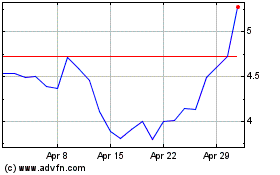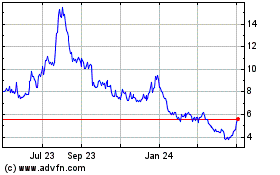Europe, Iran Say They Have Plans To Cope With EU Oil Embargo
January 24 2012 - 5:27PM
Dow Jones News
The European Union and Iran on Tuesday both said they have plans
to make up for the bloc's planned embargo on Iranian oil, as the EU
added it was seeking a coordinated import cut with some Asian
nations.
The sanctions were agreed upon Monday by foreign ministers and
represented the most significant ratcheting up of pressure on Iran
thus far from Brussels over Tehran's nuclear program.
A senior EU official said Tuesday the bloc has "specific" plans
to ensure member states can access oil supplies even after its
embargo on Iranian crude exports comes into force. Refiners in
recent days have said they had approached possible suppliers,
including Russians and Saudis, to make up for the loss of Iranian
crude.
The remarks echoed those from the state-owned National Iranian
Oil Co., which said late Monday it has "taken necessary measures to
cope" with the EU ban and "will replace easily European
customers."
Some of the EU's most troubled economies--Greece, Italy and
Spain--are the main importers of Iranian oil into the 27-nation
bloc. Greece won a guarantee in Monday's talks--at which the
embargo was agreed on--that the EU would take all necessary
measures to ensure continuity of supply.
The European official told reporters that the plans included
discussions with oil suppliers as well as work within the EU to
help member states deal with issues such as the price of imports
and financial conditions under which imports take place. He didn't
give details.
"The consequences for member states" of the oil embargo are
"extremely important," the official said, adding that the EU has
"specific and precise plans" to ensure supplies.
The European Union said Tuesday it will review the impact of the
embargo--due to start July 1--by meeting in April and will take
into account the economic situation of the largest Iranian oil
importers.
The EU official said decisions over who would replace the lost
Iranian supply were "very delicate" but that policy makers had been
talking for some time with oil producers, without naming
countries.
The official said the make-up of alternative suppliers will
ultimately depend on political decisions from producing countries,
adding that many Middle Eastern producers have an interest in
seeing Iran's nuclear ambitions curtailed.
The official also said the EU had held "preliminary" talks with
Japan and South Korea about the Asian nations replicating the
import ban. Were they to do so, close to 50% of Iran's export
market could be off limits. The official said in these talks, it
was clear that the EU would need to act first.
"It's obvious that these countries were waiting for the EU to
take the lead," the official said.
The official also said the EU hopes that, at the very least,
India and China--which have been critical of the sanctions--play a
"neutral" role and don't increase their purchases of Iranian oil.
Stricter U.S. sanctions on dealing with Iran's central bank, which
were approved in late 2011, could help on this matter, as the
legislation slaps sanctions on foreign financial firms that deal
with the central bank, which handles most of Iran's oil-export
trades.
Iran has already dismissed the EU embargo as unfair and
ineffective. Even in Brussels, there are concerns about whether the
measures will produce a change in Iran's actions.
The EU official said the sanctions were aimed neither at regime
change nor at forcing Iran to abandon its nuclear program, which
critics say is aimed at developing nuclear weapons. That would only
happen through negotiations, the official said, and the point was
to pressure Iran back into talks.
"Time is essential in order to have the proper effect and to
avoid unintended effects," the official said.
-By Laurence Norman and Benoit Faucon, Dow Jones Newswires; +32
(0)2 741 1481; laurence.norman@dowjones.com
NIO (NYSE:NIO)
Historical Stock Chart
From Jun 2024 to Jul 2024

NIO (NYSE:NIO)
Historical Stock Chart
From Jul 2023 to Jul 2024
